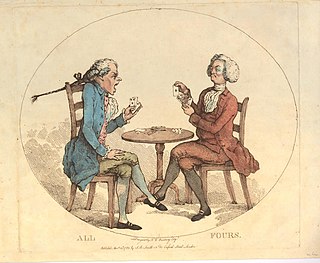
All fours is a traditional English card game, once popular in pubs and taverns as well as among the gentry, that flourished as a gambling game until the end of the 19th century. It is a trick-taking card game that was originally designed for two players, but developed variants for more players. According to Charles Cotton, the game originated in Kent, but spread to the whole of England and eventually abroad. It is the eponymous and earliest recorded game of a family that flourished most in 19th century North America and whose progeny include pitch, pedro and cinch, games that even competed with poker and euchre. Nowadays the original game is especially popular in Trinidad and Tobago, but regional variants have also survived in England. The game's "great mark of distinction" is that it gave the name 'jack' to the card previously known as the knave.

Euchre or eucre is a trick-taking card game commonly played in Australia, Canada, Great Britain, New Zealand, and the Midwestern United States. It is played with a deck of 24, 28, or 32 standard playing cards. There are normally four players, two on each team, although there are variations for two to nine players.
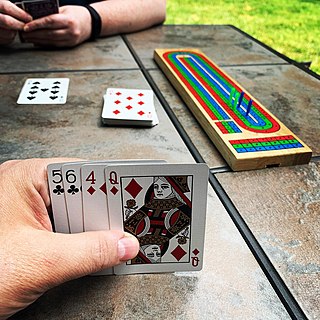
Cribbage, or crib, is a card game, traditionally for two players, that involves playing and grouping cards in combinations which gain points. It can be adapted for three or four players.
Marjapussi is a traditional Finnish trick taking game for 4 players playing in 2 partnerships and is one of the Mariage family, its key feature being that the trump suit is determined in the middle of the play by declaring a marriage. There are variants of marjapussi for two and three players.
Pedro is an American trick-taking card game of the All Fours family based on Auction Pitch. Its most popular variant is known as Cinch, Double Pedro or High Five which was developed in Denver, Colorado around 1885 and soon regarded as the most important American member of the All Fours family. Although it went out of fashion with the rise of Auction Bridge, it is still widely played on the western coast of the United States and in its southern states, being the dominant game in some locations in Louisiana. Forms of the game have been reported from Nicaragua, the Azores, Niobe NY, Italy and Finland. The game is primarily played by four players in fixed partnerships, but can also be played by 2–6 individual players.
Pitch is the American name of the English trick-taking game of Blind All Fours which, in turn, is derived from classic All Fours. Historically, Pitch started as "Blind All Fours", a very simple All Fours variant that is still played in England as a pub game. The modern game involving a bidding phase and setting back a party's score if the bid is not reached came up in the middle of the 19th century and is more precisely known as Auction Pitch or Setback.
Cinch, also known as Double Pedro or High Five, is an American trick-taking card game of the All Fours family derived from Auction Pitch via Pedro. Developed in Denver, Colorado in the 1880s, it was soon regarded as the most important member of the All Fours family in the USA, but went out of fashion with the rise of Auction Bridge. The game is primarily played by 4 players in fixed partnerships, but can also be played by 2–6 individual players.
Catch the ten, also called Scots whist or Scotch whist, is an 18th-century point-trick ace–ten card game that is recorded as being played only in Scotland, although evidence suggests a possible German origin. Unlike standard whist, it is played with a pack of only 36 cards, the fives and below being omitted. In the trump suit, the jack is the highest card. Despite its alternative name, it has nothing to do with standard whist.

Klaverjas or Klaverjassen is a Dutch, four player, trick-taking card game that uses a Piquet pack of 32 playing cards. It is closely related to the internationally popular card game of Klaberjass. Klaverjas is one of the most popular card games in the Netherlands, traditionally played in cafes and social clubs. The game offers a considerable level of complexity and depth. It has numerous variants, but its basic rules are universal.
Smear is a North-American trick-taking card game of the All Fours group, and a variant of Pitch (Setback). Several slightly different versions are played in Michigan, Minnesota, Northern and Central Iowa, Wisconsin and also in Ontario, Canada.

Botifarra is a point trick-taking card game for four players in fixed partnerships played in Catalonia, in the northeast of Spain, and parts of Aragon, the Balearic Islands and North of the Valencian Country. It is a historical game also played in many parts of Spain, not only in bars and coffee shops. The game is closely related to Manille from which it takes the mechanics, but its rules induce deduction and minimise the effects of luck.

Klaberjass or Bela is a trick-taking ace–ten card game that is most popular in German communities. In its basic form it is a 9-card trick-and-draw game for two players using a 32-card piquet pack.

The following is a glossary of terms used in card games. Besides the terms listed here, there are thousands of common and uncommon slang terms. Terms in this glossary should not be game-specific, but apply to a wide range of card games played with non-proprietary packs. It should not include terms solely related to casino or banking games. For glossaries that relate primarily to one game or family of similar games, see Game-specific glossaries.
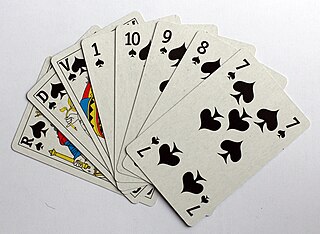
Triomphe, once known as French ruff, is a card game dating from the late 15th century. It most likely originated in France or Spain and later spread to the rest of Europe. When the game arrived in Italy, it shared a similar name with the pre-existing game and deck known as trionfi; probably resulting in the latter becoming renamed as Tarocchi (tarot). While trionfi has a fifth suit that acts as permanent trumps, triomphe randomly selects one of the existing four suits as trumps. Another common feature of this game is the robbing of the stock. Triomphe became so popular that during the 16th century the earlier game of trionfi was gradually renamed tarocchi, tarot, or tarock. This game is the origin of the English word "trump" and is the ancestor of many trick-taking games like Euchre and Whist. The earliest known description of Triomphe was of a point-trick game, perhaps one of the earliest of its type; later, the name was applied to a plain-trick game.

Scharwenzel, formerly also called Schipper-Schrill, is a traditional north German plain-trick card game of the Schafkopf family that is played by two teams with two to four players on each team. The game is at least three centuries old and is played today only on the island of Fehmarn in the German state of Schleswig-Holstein. It may be a regional variant of German Solo with which it bears some similarities and it may also have been ancestral to Schafkopf. It is not related to a different game called Scharwenzel or Scherwenzel that was once played in Bavaria.
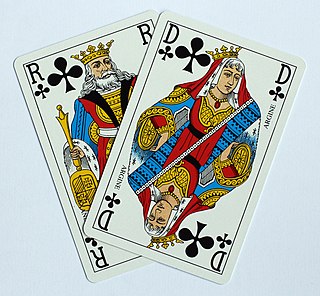
Briscan is an 18th-century, French ace–ten card game for two players played with a 32-card piquet pack. It is a member of the marriage group of games in which the 'marriage' of a king and queen brings a bonus score, but briscan takes this simple concept to extraordinary lengths.

Norseman's knock or Norrlandsknack is a classic Swedish card game for 3 to 5 players, known since the mid-1800s. It is traditionally played for money. The game is about winning as many tricks as possible and above all not being completely left without a trick.

Penneech or Peneech, sometimes called Penicth, is an unusual historical English card game for two players played with hands of seven cards. English point-trick games are rare anyway, but the unique feature of this game is that the trump suit changes with each trick. Parlett describes it as a "jolly little two-hander".
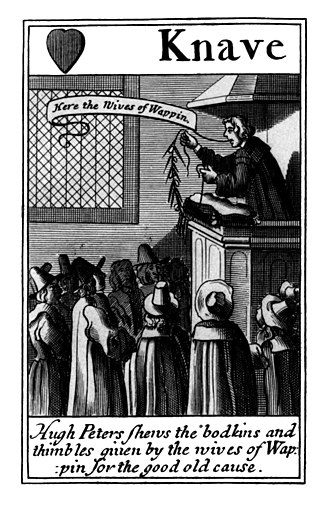
Costly Colours, sometimes just called Costly, is an historical English card game for two players and a "fascinating relative of cribbage". The game "requires a moderate amount of skill in playing, and is well adapted to teach quickness in counting". It has more combinations than cribbage and retains the original scoring system for points, but does not use a 'crib'. In the 19th century it was described as "peculiar to Shropshire."
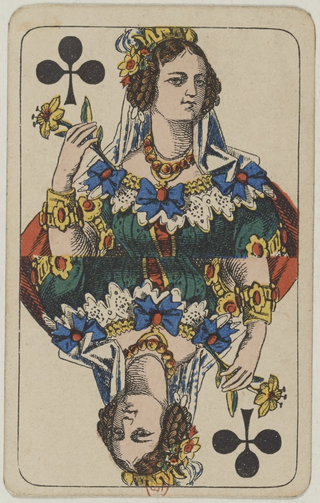
Sjavs is a Danish card game of the Schafkopf family that is played in two main variants. In Denmark, it is a 3-player game, played with a shortened pack of 20 cards; in the Faroe Islands, where it is very popular, it is a four-hand, partnership game using a standard piquet pack of 32 cards.















